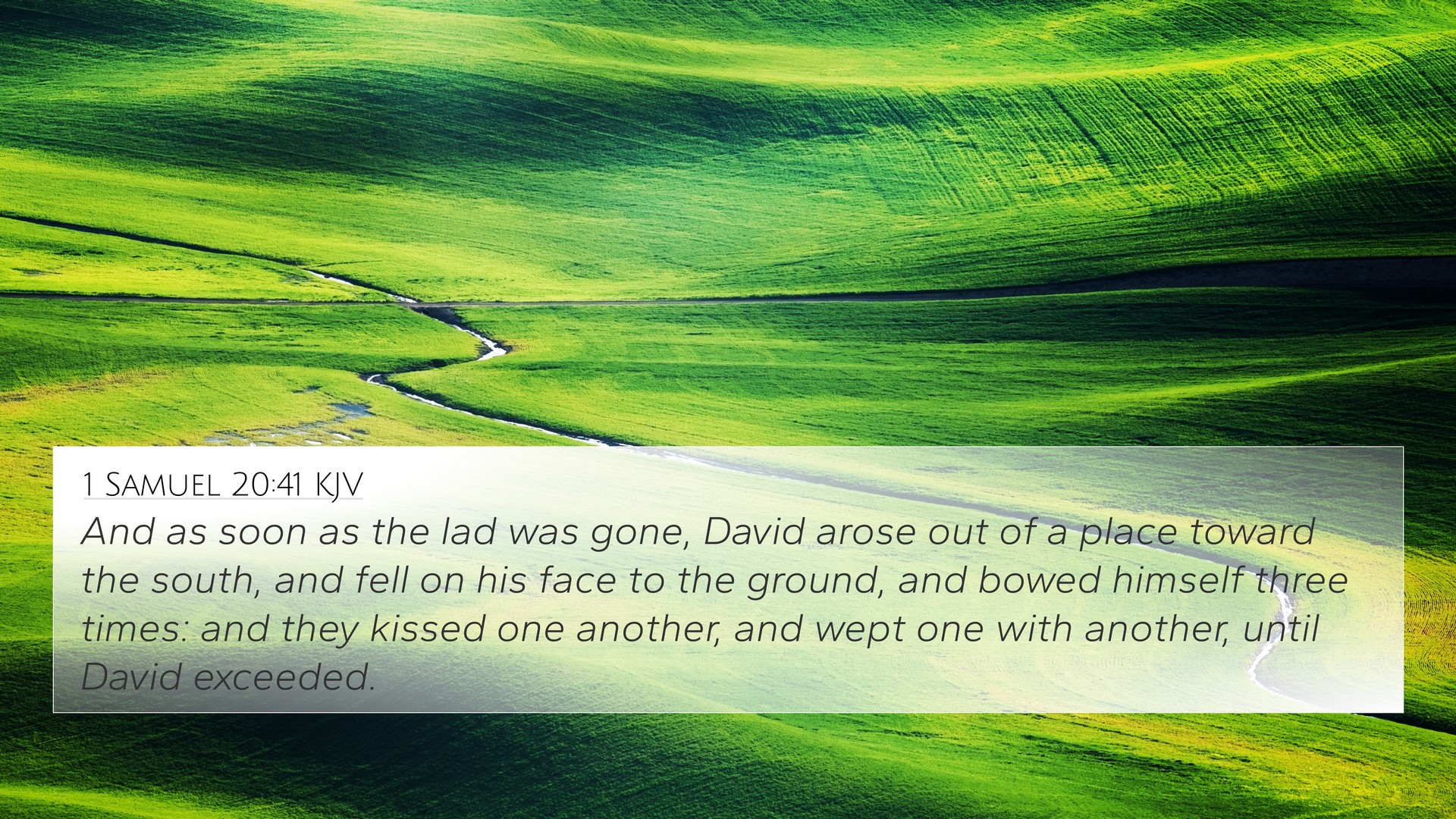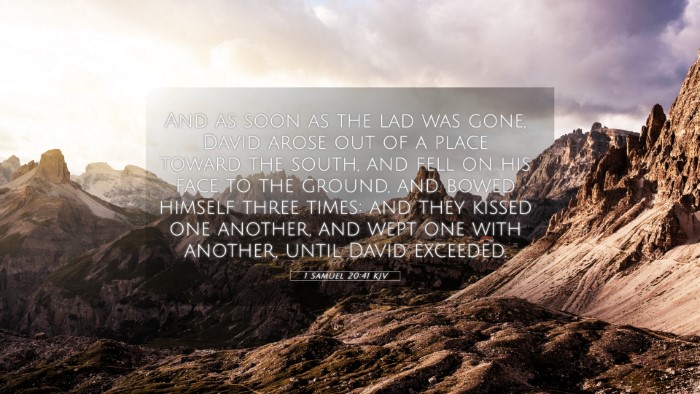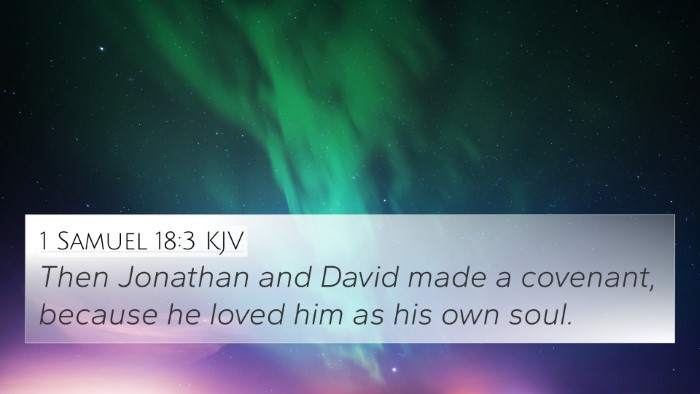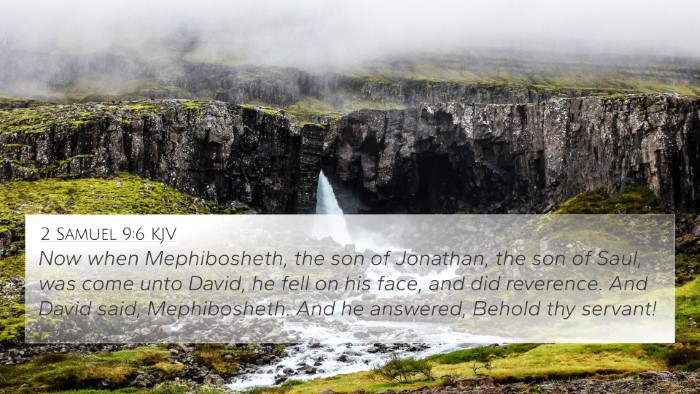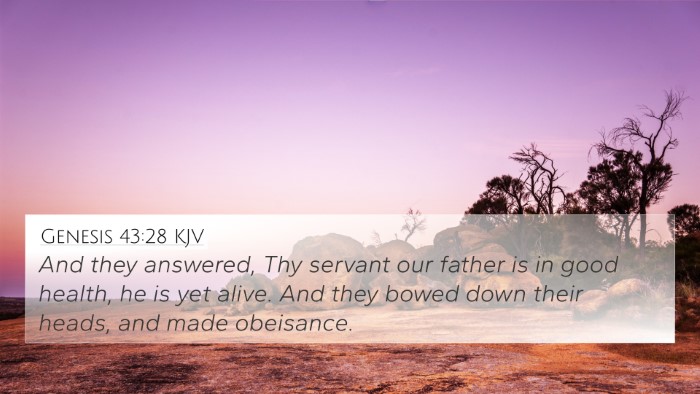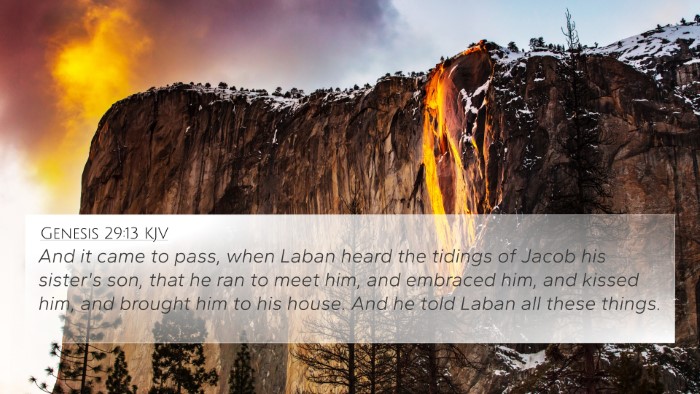Understanding 1 Samuel 20:41
1 Samuel 20:41 is a poignant verse that conveys deep emotions and significant themes in the narrative of David and Jonathan. This verse reads:
"And as soon as the lad was gone, David arose out of a place toward the south, and fell on his face to the ground, and bowed himself three times: and they kissed one another, and wept one with another, until David exceeded." (1 Samuel 20:41, KJV)
Meaning and Insights from Commentaries
This verse captures a heartfelt moment of farewell between David and Jonathan, filled with sorrow and mutual love. The insights drawn from public domain commentaries provide a deeper understanding of the text:
- Matthew Henry's Commentary:
Henry describes this scene as one of the most touching moments in Scripture, emphasizing the profound bond of friendship and loyalty. He notes that David and Jonathan's relationship exemplifies true love and sacrifice, contrasting their noble feelings with the treachery of Saul. This farewell illustrates the pain of separation faced by those bound by genuine affection.
- Albert Barnes' Notes:
Barnes elaborates on the significance of David’s physical gestures—bowing and kissing—indicating reverence and deep emotional connection. He interprets David's actions as an acknowledgment of Jonathan's support during perilous times and a recognition of the divine plan unfolding that would separate them. Additionally, he points out the emotional intensity of David exceeding in weeping, demonstrating the weight of their impending separation.
- Adam Clarke's Commentary:
Clarke provides a historical perspective, suggesting that the farewell is emblematic of the broader political strife between David and Saul. He highlights that even in moments of personal grief, David reflects a greater kingdom conflict. Clarke mentions how David's deep sorrow over Jonathan’s departure foreshadows the trials he will face as the future king of Israel.
Key Themes and Reflections
The themes captured in 1 Samuel 20:41 include:
- Friendship and Loyalty: The bond between David and Jonathan emphasizes loyalty amidst adversity. Their departure signifies the sacrifices friends make for one another.
- Empathy and Grief: The emotional display of weeping highlights the human experience of grief and the need for peer support during difficult times.
- Divine Providence: The context of the farewell suggests that God has a plan for David’s future, despite the heartache, leading him to his destiny as king.
Cross-References
To understand the broader biblical context and connections, we may consider the following related verses:
- Proverbs 17:17: "A friend loveth at all times, and a brother is born for adversity."
- John 15:13: "Greater love hath no man than this, that a man lay down his life for his friends."
- 1 Samuel 18:1-3: The establishment of David and Jonathan's friendship.
- 2 Samuel 1:25-26: David mourning Jonathan's death, reinforcing their bond.
- 1 Kings 19:1-4: Elijah's despair mirrors David's feelings, showing the theme of sorrow in prophetic roles.
- Psalm 133:1: Celebrating the unity and harmony found in relationships.
- Romans 12:15: "Rejoice with those who rejoice; mourn with those who mourn," illustrating empathy in friendship.
Final Thoughts
In conclusion, 1 Samuel 20:41 serves as a powerful reminder of the importance of friendships that endure through trials. The emotional depth of David and Jonathan's farewell can inspire modern believers to reflect on their own relationships and the loyalty required in the face of life's challenges.
Combining Themes and Cross-Referencing
This verse invites a rich dialogue within Scripture as it links various themes of loyalty, sacrifice, and divine oversight through cross-referencing:
- Tools for Bible Cross-Referencing: Engaging with resources such as Bible concordances or cross-reference guides can deepen one’s study.
- Finding Connections: Identifying similar themes and characters across the Old and New Testaments enhances understanding of God's love and human relationships.
- Bible Study Methods: Utilizing cross-referencing techniques can reveal connections, such as comparing David's songs in the Psalms with his relationships in 1 Samuel.
